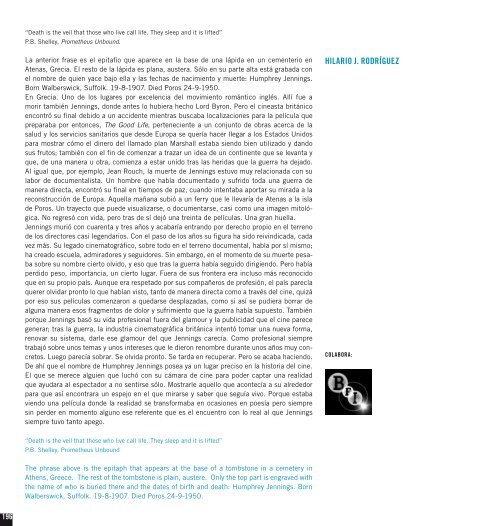A PEPE ESCRICHE - Festival de Cine de Huesca
A PEPE ESCRICHE - Festival de Cine de Huesca
A PEPE ESCRICHE - Festival de Cine de Huesca
You also want an ePaper? Increase the reach of your titles
YUMPU automatically turns print PDFs into web optimized ePapers that Google loves.
“Death is the veil that those who live call life. They sleep and it is lifted”<br />
P.B. Shelley, Prometheus Unbound.<br />
La anterior frase es el epitafio que aparece en la base <strong>de</strong> una lápida en un cementerio en<br />
Atenas, Grecia. El resto <strong>de</strong> la lápida es plana, austera. Sólo en su parte alta está grabada con<br />
el nombre <strong>de</strong> quien yace bajo ella y las fechas <strong>de</strong> nacimiento y muerte: Humphrey Jennings.<br />
Born Walberswick, Suffolk. 19-8-1907. Died Poros 24-9-1950.<br />
En Grecia. Uno <strong>de</strong> los lugares por excelencia <strong>de</strong>l movimiento romántico inglés. Allí fue a<br />
morir también Jennings, don<strong>de</strong> antes lo hubiera hecho Lord Byron. Pero el cineasta británico<br />
encontró su final <strong>de</strong>bido a un acci<strong>de</strong>nte mientras buscaba localizaciones para la película que<br />
preparaba por entonces, The Good Life, perteneciente a un conjunto <strong>de</strong> obras acerca <strong>de</strong> la<br />
salud y los servicios sanitarios que <strong>de</strong>s<strong>de</strong> Europa se quería hacer llegar a los Estados Unidos<br />
para mostrar cómo el dinero <strong>de</strong>l llamado plan Marshall estaba siendo bien utilizado y dando<br />
sus frutos; también con el fin <strong>de</strong> comenzar a trazar un i<strong>de</strong>a <strong>de</strong> un continente que se levanta y<br />
que, <strong>de</strong> una manera u otra, comienza a estar unido tras las heridas que la guerra ha <strong>de</strong>jado.<br />
Al igual que, por ejemplo, Jean Rouch, la muerte <strong>de</strong> Jennings estuvo muy relacionada con su<br />
labor <strong>de</strong> documentalista. Un hombre que había documentado y sufrido toda una guerra <strong>de</strong><br />
manera directa, encontró su final en tiempos <strong>de</strong> paz, cuando intentaba aportar su mirada a la<br />
reconstrucción <strong>de</strong> Europa. Aquella mañana subió a un ferry que le llevaría <strong>de</strong> Atenas a la isla<br />
<strong>de</strong> Poros. Un trayecto que pue<strong>de</strong> visualizarse, o documentarse, casi como una imagen mitológica.<br />
No regresó con vida, pero tras <strong>de</strong> sí <strong>de</strong>jó una treinta <strong>de</strong> películas. Una gran huella.<br />
Jennings murió con cuarenta y tres años y acabaría entrando por <strong>de</strong>recho propio en el terreno<br />
<strong>de</strong> los directores casi legendarios. Con el paso <strong>de</strong> los años su figura ha sido reivindicada, cada<br />
vez más. Su legado cinematográfico, sobre todo en el terreno documental, habla por sí mismo;<br />
ha creado escuela, admiradores y seguidores. Sin embargo, en el momento <strong>de</strong> su muerte pesaba<br />
sobre su nombre cierto olvido, y eso que tras la guerra había seguido dirigiendo. Pero había<br />
perdido peso, importancia, un cierto lugar. Fuera <strong>de</strong> sus frontera era incluso más reconocido<br />
que en su propio país. Aunque era respetado por sus compañeros <strong>de</strong> profesión, el país parecía<br />
querer olvidar pronto lo que habían visto, tanto <strong>de</strong> manera directa como a través <strong>de</strong>l cine, quizá<br />
por eso sus películas comenzaron a quedarse <strong>de</strong>splazadas, como si así se pudiera borrar <strong>de</strong><br />
alguna manera esos fragmentos <strong>de</strong> dolor y sufrimiento que la guerra había supuesto. También<br />
porque Jennings basó su vida profesional fuera <strong>de</strong>l glamour y la publicidad que el cine parece<br />
generar; tras la guerra, la industria cinematográfica británica intentó tomar una nueva forma,<br />
renovar su sistema, darle ese glamour <strong>de</strong>l que Jennings carecía. Como profesional siempre<br />
trabajó sobre unos temas y unos intereses que le dieron renombre durante unos años muy concretos.<br />
Luego parecía sobrar. Se olvida pronto. Se tarda en recuperar. Pero se acaba haciendo.<br />
De ahí que el nombre <strong>de</strong> Humphrey Jennings posea ya un lugar preciso en la historia <strong>de</strong>l cine.<br />
El que se merece alguien que luchó con su cámara <strong>de</strong> cine para po<strong>de</strong>r captar una realidad<br />
que ayudara al espectador a no sentirse sólo. Mostrarle aquello que acontecía a su alre<strong>de</strong>dor<br />
para que así encontrara un espejo en el que mirarse y saber que seguía vivo. Porque estaba<br />
viendo una película don<strong>de</strong> la realidad se transformaba en ocasiones en poesía pero siempre<br />
sin per<strong>de</strong>r en momento alguno ese referente que es el encuentro con lo real al que Jennings<br />
siempre tuvo tanto apego.<br />
“Death is the veil that those who live call life. They sleep and it is lifted”<br />
P.B. Shelley, Prometheus Unbound<br />
The phrase above is the epitaph that appears at the base of a tombstone in a cemetery in<br />
Athens, Greece. The rest of the tombstone is plain, austere. Only the top part is engraved with<br />
the name of who is buried there and the dates of birth and <strong>de</strong>ath: Humphrey Jennings. Born<br />
Walberswick, Suffolk. 19-8-1907. Died Poros 24-9-1950.<br />
HILARIO J. RODRÍGUEZ<br />
COLABORA:<br />
HUMPHREY<br />
JENNINGS<br />
In Greece. One of the places of excellence of the English romantic movement. There, Jennings,<br />
also went to die, just as had Lord Byron before him. However, the English filmmaker met his <strong>de</strong>ath<br />
as result of an acci<strong>de</strong>nt whilst searching for a location for the film he was then preparing, The<br />
Good Life, belonging to a collection of works about health and sanitary services that Europe was<br />
trying to send to the United States to show how efficiently the money from the so-called Marshall<br />
Plan was being used and reaping its rewards; as well as portaying the i<strong>de</strong>a of a Continent that<br />
was lifting itself up, and that in one form or another, was beginning to unite from the wounds left<br />
by the war. Just like, for example, Jean Rouch, the <strong>de</strong>ath of Jennings was related to his work as<br />
a documentary filmmaker. A man who had documented and suffered the war directly, he met his<br />
<strong>de</strong>ath in times of peace, when he was trying to contribute to the reconstruction of Europe. That<br />
particular morning, he boar<strong>de</strong>d the ferry that would take him from Athens to the Island of Poros.<br />
A journey that can be almost visualised or documented as a mythological image. It was a journey<br />
of no return, but he had left some thirty films behind him. A tremendous feat.<br />
Jennings died at the age of forty-three and from his own merit would enter into the world of<br />
those directors consi<strong>de</strong>red legendary. Over the years his works have been more and more in<br />
<strong>de</strong>mand. His filmmaking, especially in the field of documentaries, speaks for itself; it has<br />
created schools, admirers and followers. However, at the time of his <strong>de</strong>ath, his name was<br />
almost forgotten, even though he continued directing after the end of the war. His name had<br />
lost its weight, importance, a certain place. He was more recognised overseas than within<br />
his own country. Although he was respected by his colleagues, his country seemed to want<br />
to forget what they had witnessed, both directly and through films, perhaps that is why is his<br />
films were pushed asi<strong>de</strong>, like as if that would erase the wounds and suffering that the war had<br />
imposed on them. Also because Jennings based his professional life out of the public eye and<br />
with it the publicity that films seem to generate. After the war, the British filmmaking industry<br />
tried to take a new course, renew its system, give itself that glamour that Jennings had done<br />
without. As a professional, he always worked on topics of interest that for some years gave him<br />
recognition. Later he seemed to be unwanted. How soon one forgets. Takes time to recover.<br />
But it can be done. It is from here on that the name of Humphrey Jennings takes a concrete<br />
place in the history of filmmaking. One that is truly <strong>de</strong>served by someone who with his camera<br />
attempted to capture a reality that would help the audience not feel so alone. To show that<br />
which was happening around them so they could look into a mirror and feel they were still<br />
alive. Because they were watching a film where the reality at times would be transformed into<br />
poetry, but never losing that particular moment that reference with reality to which Jennings<br />
had always had such an attachment.<br />
196 197




